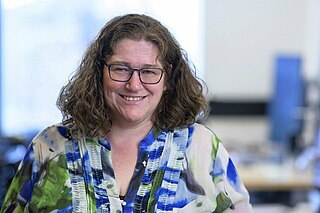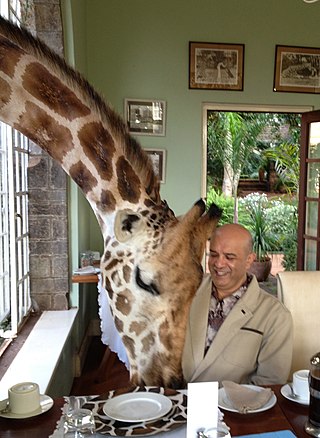The Cancer Genome Atlas (TCGA) is a project to catalogue the genetic mutations responsible for cancer using genome sequencing and bioinformatics. The overarching goal was to apply high-throughput genome analysis techniques to improve the ability to diagnose, treat, and prevent cancer through a better understanding of the genetic basis of the disease.

Aviv Regev is a computational biologist and systems biologist and Executive Vice President and Head of Genentech Research and Early Development in Genentech/Roche. She is a core member at the Broad Institute of MIT and Harvard and professor at the Department of Biology of the Massachusetts Institute of Technology. Regev is a pioneer of single cell genomics and of computational and systems biology of gene regulatory circuits. She founded and leads the Human Cell Atlas project, together with Sarah Teichmann.

Dana Pe'er, Chair and Professor in Computational and Systems Biology Program at Sloan Kettering Institute is a researcher in computational systems biology. A Howard Hughes Medical Institute (HHMI) Investigator since 2021, she was previously a professor at Columbia Department of Biological Sciences. Pe'er's research focuses on understanding the organization, function and evolution of molecular networks, particularly how genetic variations alter the regulatory network and how these genetic variations can cause cancer.
Luis Alberto Diaz, Jr. is the Head of the Division of Solid Tumor Oncology in Memorial Sloan Kettering’s Department of Medicine.

Crystal L. Mackall is an American physician and immunologist. She is currently the Ernest and Amelia Gallo Family Professor of Pediatrics and Medicine at Stanford University. She is the founding director of the Stanford Center for Cancer Cell Therapy.
Professor Carlos Caldas is a clinician scientist and Senior Group Leader at the Cancer Research UK Cambridge Institute, University of Cambridge. He is the Chair of Cancer Medicine at the University of Cambridge, an Honorary Consultant Medical Oncologist at Addenbrooke's Hospital and Director of the Cambridge Breast Cancer Research Unit. He is a fellow of Robinson College, Cambridge and an Emeritus Senior Investigator at the National Institute for Health Research (NIHR).
Professor Jason Carroll is a British medical researcher serving as a Senior Group Leader at the Cancer Research UK Cambridge Institute, University of Cambridge and Founder and Chief Scientific Officer of Azeria Therapeutics. He is a Professor of Molecular Oncology assigned to the Department of Oncology and a Fellow of Clare College, Cambridge.

Vishva Mitra Dixit is a physician of Indian origin who is the current Vice President of Discovery Research at Genentech.
Sylvia Katina Plevritis is Professor and Chair of the Department of Biomedical Data Science at Stanford University.

Alberto Bardelli is an Italian geneticist and cancer researcher, expert in the field of precision medicine. He is a full professor of histology at the Department of Oncology, University of Turin and Scientific Director of IFOM, the AIRC Institute of Molecular Oncology.
Serena Nik-Zainal is a British-Malaysian clinician who is a consultant in clinical genetics and Cancer Research UK advanced clinician scientist at the University of Cambridge. She makes use of genomics for clinical applications. She was awarded the Crick Lecture by the Royal Society in 2021. Serena Nik-Zainal was also recognized as one of the 100 Influential Women in Oncology by OncoDaily.
Cigall Kadoch is an American biochemist and cancer biologist who is Associate Professor of Pediatric Oncology at the Dana–Farber Cancer Institute and Harvard Medical School and an Investigator at the Howard Hughes Medical Institute. Her research is focused in chromatin regulation and how changes in cellular structure can lead to human diseases, such as Cancer, Neurodevelopmental disorders, and others. She is internationally recognized for her work on the mammalian SWI/SNF complex, a large molecular machine known as a Chromatin remodeling complex. She was named as one of the world's leading scientists by MIT Technology Review, 35 Under 35 and Forbes 30 Under 30, and a Finalist for the Blavatnik Awards for Young Scientists. In 2019, she received the Martin and Rose Wachtel Cancer Research Prize from the American Association for the Advancement of Science and in 2020, the American Association for Cancer Research Outstanding Achievement in Basic Cancer Research Award. Kadoch was also recognized as one of the 100 Influential Women in Oncology by OncoDaily.
Franziska Michor is an Austrian-American computational biologist who is a Professor in the Department of Data Science at the Dana–Farber Cancer Institute. She serves as Director of the Physical Sciences-Oncology Center and the Center for Cancer Evolution.

George Coukos is a physician-scientist in tumor immunology, professor and director of the Ludwig Cancer Research Lausanne Branch and director of the Department of oncology UNIL-CHUV of the University of Lausanne and the Lausanne University Hospital in Lausanne, Switzerland. He is known for his work on the mechanisms by which tumors suppress anti-cancer immune responses, and the role of the tumor vasculature in that suppression. In addition to his work in ovarian cancer, the combinatorial immune therapies proposed by Professor Coukos have been successfully tested and approved for lung, liver and kidney cancers.
Mona Mostafa Mohamed is an Egyptian doctor and head of the Cancer Biology Research Laboratory at Cairo University in Giza, Egypt. In 2005 she was granted the Avon Foundation-AACR International Scholar Award for her dedication to breast cancer research. Mohamed is known for her research on locally activated breast cancer, metastatic breast cancer, and inflammatory breast cancer.

María S. (Marisol) Soengas is a Spanish immunologist who is a senior scientist at the Spanish National Cancer Research Center (CNIO). Her research considers melanoma and the development of new therapeutic strategies. She was elected to the European Molecular Biology Organization in 2022.
Karina Elizabeth de Visser, also named "Karin E. de Visser", is a researcher at the Netherlands Cancer Institute. Her research considers metastatic formation and how the immune system influences how people respond to cancer treatment.
Lisa M. Coussens is an American cancer scientist who is Chair of the Department of Cell, Developmental and Cancer Biology and Professor and Associate Director for Basic Research in the Knight Cancer Institute at the Oregon Health & Science University. She serves as President of the American Association for Cancer Research.
Anjali Kusumbe is a British-Indian biologist who is the Head of the Tissue and Tumour Microenvironments Group at the Medical Research Council Weatherall Institute of Molecular Medicine at the University of Oxford. She was awarded the Royal Microscopical Society Award for Life Sciences in 2022.
Susan Hankinson is an American cancer researcher who is the Distinguished Professor of Epidemiology at the University of Massachusetts Amherst. Her research considers cancer epidemiology and the etiology of breast cancer. Her work has demonstrated the relationship between hormones and breast cancer risk. In 2023, she was awarded the American Association for Cancer Research Award for Research Excellence in Cancer Epidemiology and Prevention.







